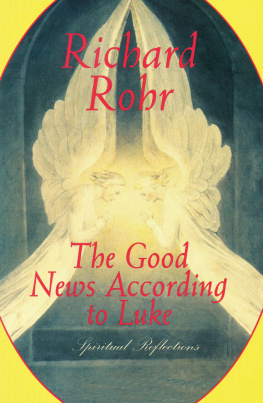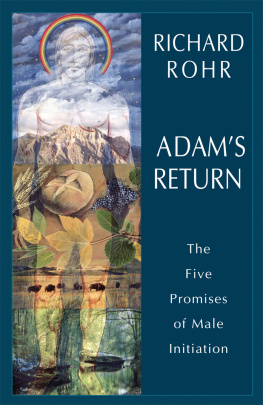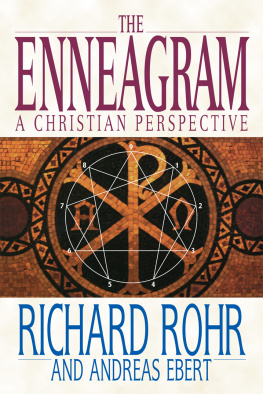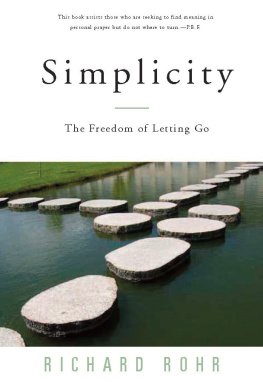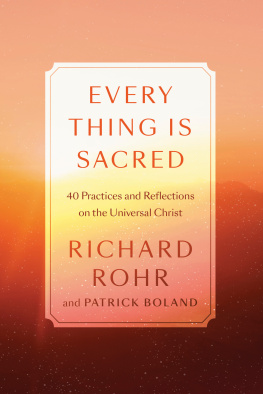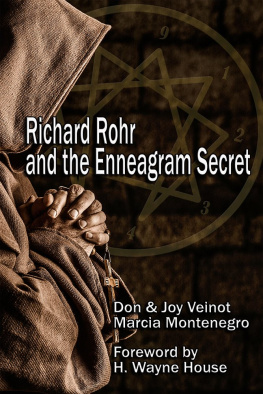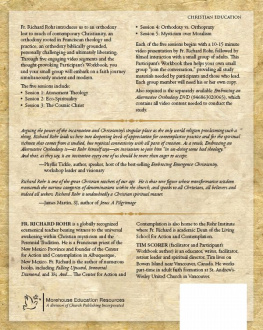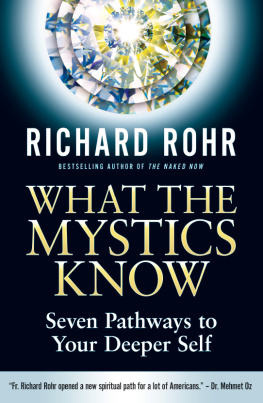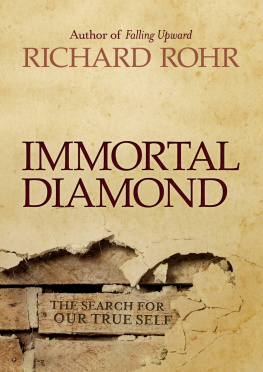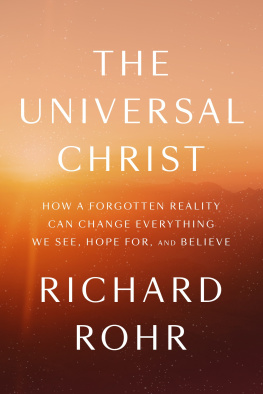I would especially like to thank Louis Savary, who has had the humility, love, and patience to move this text from spoken word on tape to written and readable form.
His work was refined and supported by John Eagleson and the family-like staff at Crossroad. With such friends as these, work is turned into joy and my rambling thoughts become words that even Luke might be proud of.

All religions have tried to discover something about Gods nature and purpose. They have used their own common sense, their own logic, their own experience and their own images to come up with a description of God. What is unique about the Judeo-Christian tradition is that we believe God is the one who has revealed to us who God is. It is much more the story of God trying to get to us. This revelation came through the faith experience of the Jewish people, of which Christianity is a development. We believe God has chosen the path of divine self-revelation. God is the one who told us about God. God has shared with us what goes on in the divine heart. In addition, Christians believe that God has even shared with us the divine flesh in Jesus. The bottom line is: God has revealed Godself to us through self-disclosure.
People, especially in Western civilization, are uncomfortable with personal and intimate self-revelation coming from God or from anyone else, for that matter. Were more comfortable thinking about God conceptually than standing in the powerful presence of Gods self-revelation. A cartoon made this point well. There were pictured two doorways, one marked Heaven and the other marked Lecture on Heaven. Waiting to enter the lecture room was a long line of people, but almost no one stood before the door leading to the direct experience of God.
Since we are more comfortable in our heads than in our hearts, we tend to avoid facing Gods self-disclosure in Scripture. Instead of viewing the Bible as a personal and intimate dialogue between God and humans characterized by divine revelation and our human faith response to it we have turned Scripture largely into conceptual and informational content: a set of facts, figures, data, and phenomena which we are supposed to learn. As long as we learn these facts and ideas, we believe that somehow they will save us, liberate us, and bring us to God. We have squeezed the biblical story of Gods self-revelation into an intellectual package a document of conceptual material.
Thus, we have transformed the Bible into an abstraction. Once such a transformation happens and people agree to it, we begin to argue about the interpretations of that abstraction. We prefer to argue about the Bible and how it is to be interpreted, because the content has become the all-important thing.
We seem to believe that God could create human unity, bring about the divine purposes, and reveal Gods heart through words and doctrinal formulations. But the most precise formulation of words and their most accurate translations into other languages can never communicate the heart of God and the mind of Christ. Still, we are more comfortable with words, formulations, translations, and arguments. We prefer the lecture on heaven to heaven itself.
I wont say that biblical information isnt important; however, during the past four or five hundred years, scriptural facts and figures have been so emphasized that the Bible has become a tool for dividing people rather than uniting them. Throughout history, we see groups taking sides because of the Bible.
The Bible is not a lecture or treatise on God; it is a story of the experience of God. It is the story of God revealing Godself to a people and what happens after that encounter: some run away from it, some avoid it, some dismiss it, some actively oppose it, some waver, and some fall to their knees in recognition. It is always a text in travail, never just easy answers like the seven secrets of success.
Its been said that Protestantism has usually depended on scriptural authority, while Catholicism depended on both Scripture and tradition. Tradition is an ambiguous word. For many people it just means the way we used to do things. Most who call themselves traditionalists are simply conservatives by temperament. It scares many Protestant brothers and sisters when Catholics claim that any way we used to do things is always good to draw upon.
When I use the word tradition, Im talking about one continuous four-thousand-year tradition that is, two thousand years of Judaism and two thousand years of Christianity not about traditions, plural. Traditions, as endearing as they might be, can also become clannish, violent, xenophobic, and resistant to true transcendence.
Tradition is what gives breadth to a Catholic theology; it draws not only from the chronicled accounts we find in the biblical books, but also from the ongoing events of the believing community. Tradition says, in effect, that God is continuously revealing the divinity. Gods self-revelation may be found not only in the sacred books, but also in the people who live in the spirit of God in every age and in the history of our planet and all creation.
I think the importance of tradition in this sense is justified in terms of what we see Luke doing in his gospel. Luke himself is creating his gospel by using Scripture and tradition, and hes doing it within a believing community. In putting together his gospel, hes not only drawing on past Scriptures, such as the Hebrew Bible and Marks Gospel, but hes also weaving in contemporary spirituality, knowledge of the theological schools of Judaism, experience of the times, insights of the believing community (the living Body of Christ), and putting it all together.
If you insist that its not biblical to integrate Scripture and tradition in the context of the believing community, logically you must also assert that the New Testament writers were not biblical. If the only way to be biblical is to quote the Scriptures and nothing else, then the evangelists themselves were not biblical, because they didnt just quote the Scriptures. The early Christians used the Scriptures as part of an entire way of thinking, relating, and communicating within their faith community. As communicators of a message and a meaning, the evangelists called upon the best they could gather from their tradition as a faith community to communicate Gods power and presence.
This approach seems to me to be so self-evident it is amazing that certain people who claim to be biblical dont see it. By their definition of biblical, the very biblical people they quote are not biblical. This is important because, even today, to hold such a narrow definition of biblical If it isnt in the Bible, it isnt true is to severely limit reality.
Thus, Catholicism has for its authority the book, tradition, and the believing community (the Body of Christ). For me, these three sources are all summed up in the word church.
Christian Scripture remains a point of contention and division because it is interpreted apart from the living church to which it was first given, apart from the various early Christian communities each telling its story of their experience of the risen Christ. The New Testament indeed contains divine words about Christ, but mostly it contains words spoken by the early faith community as it stood in relation to Christ. The Bibles words reflect the way Christ was understood by the men and women who made up the church when Matthew, Mark, Luke, John, Paul, and the others were writing.
The sacred text, then, is one step removed from a direct experience of Christ. It is now generally accepted by Scripture scholars that most of the evangelists certainly Mark and Luke never physically encountered Jesus. Matthew and John, as gospel authors, were traditionally seen as apostles, but Mark and Luke werent. They, like us, knew him in the context of a believing community. Luke perhaps knew Jesus through Paul, but Paul never knew Jesus in the flesh either. Paul learned about Jesus through the early faith communities, those living bodies of Christ whom he visited and lived with. It was the same for Luke; he learned to know Jesus by living as part of a first-century Christian faith community.
Next page
